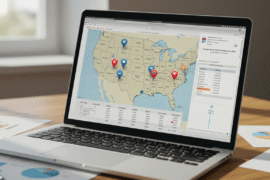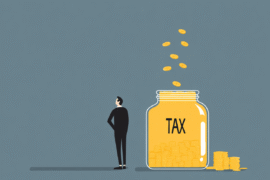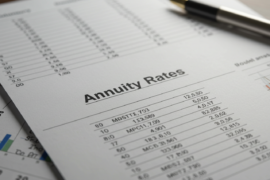This article may contain references to products or services from one or more of our advertisers or partners. We may receive compensation when you click on links to those products or services. Nonetheless, our opinions are our own.
The information presented in this article is accurate to the best of our knowledge at the time of publication. However, information is subject to change, and no guarantees are made about the continued accuracy or completeness of this content after its publication date.
When people hear the phrase “national debt,” they likely think of politicians in Washington managing it, rather than something that impacts their everyday lives. The U.S. debt has surpassed $31 trillion, and its impacts are noticeable throughout the country. This financial imbalance could lead to higher inflation, higher interest rates, and possible cuts to public services. It’s important to know what the national debt means for your finances if you want to get a mortgage, pay off student loans, or plan for retirement.
- The Scale of America’s Debt Crisis and Its Personal Implications
- How Rising Interest Rates Could Impact Your Wallet
- The Hidden Costs of Government Debt You Need to Know
- Practical Steps to Safeguard Your Financial Future
- The Importance of Building Your Emergency Fund
- Resourceful Strategies to Manage Personal Debt
- Conclusion: Take Control Before the Ripple Becomes a Wave
- Frequently Asked Questions
- Recommended Reads
The Scale of America’s Debt Crisis and Its Personal Implications
The national debt of the United States is now more than $31 trillion, which is a lot of money for each family. This debt keeps getting bigger because of federal spending, tax cuts, and economic stimulus programs that have been put in place over the years. The number may seem abstract, but the effect is very real.
How It Affects You
- Higher Interest Rates: As the government borrows more, interest rates may increase, making loans and credit more expensive.
- Inflation Pressures: A growing debt burden can weaken confidence in the economy, contributing to rising prices.
- Job Market Volatility: If federal spending is reduced to slow the debt, job growth in public-sector dependent industries may decline.
Being financially proactive is essential. By understanding how these macroeconomic shifts affect your household, you can start taking small steps that lead to long-term stability.
| Financial Metric | Current Impact | Potential Future Outlook |
|---|---|---|
| Interest Rates | Increasing | Higher costs for borrowing |
| Inflation Rate | Persistently high | Decreased purchasing power |
| Job Growth | Uncertain | Potential employment slowdowns |
How Rising Interest Rates Could Impact Your Wallet
Interest rates are closely tied to national debt levels. As borrowing needs grow, lenders demand higher yields, which trickle down to consumers.
Areas of Concern
- Loan Payments: Borrowers with variable-rate loans may see monthly payments increase significantly.
- Credit Card Debt: Higher APRs can lead to larger balances if not paid off quickly.
- Mortgage Rates: Home affordability could decrease as rates climb.
- Investment Decisions: Certain investments may become less attractive, requiring portfolio adjustments.
| Interest Rate (%) | Monthly Payment on $200,000 Loan |
|---|---|
| 3.0 | $843 |
| 4.0 | $954 |
| 5.0 | $1,073 |
| 6.0 | $1,199 |
Being aware of these changes allows you to plan ahead. If possible, lock in lower rates and prioritize paying down variable-interest debt now.
Government borrowing can have long-term effects that go beyond taxes and interest rates.
- Higher Prices: As inflation rises, everyday essentials become more expensive.
- Reduced Benefits: Government programs may face budget cuts.
- Loan Accessibility: Banks may tighten lending criteria as financial markets grow uncertain.
| Year | Projected Inflation Rate (%) | Expected Tax Increase (%) |
|---|---|---|
| 2025 | 3.5 | 2 |
| 2030 | 4.0 | 3.5 |
| 2035 | 4.5 | 5 |
These trends suggest that while debt accumulation might seem slow, its effects can accelerate and make a significant impact over time.
Voted "Best Overall Budgeting App" by Forbes and WSJ
Monarch Money helps you budget, track spending, set goals, and plan your financial future—all in one app.
Get 50% OFF your first year with code MONARCHVIP
Practical Steps to Safeguard Your Financial Future
With economic uncertainty looming, taking control of your finances is more important than ever.
Financial Wellness Checklist
- Emergency Fund: Save 3–6 months’ worth of expenses.
- Debt Reduction: Focus on high-interest debts first.
- Diversify Investments: Include stocks, bonds, and real estate to minimize risk.
Also, check your insurance policies to ensure adequate coverage across health, life, and property.
| Metric | Target | Your Current Status |
|---|---|---|
| Emergency Fund | 3–6 months of expenses | |
| Debt-to-Income Ratio | Less than 36% | |
| Savings Rate | 15% of income |
Review your progress quarterly and adjust based on changes in the broader economy.
The Importance of Building Your Emergency Fund
In a weak economy, your emergency fund is your first line of defense.
Why You Need It
- Peace of Mind: Reduces stress during job loss or emergencies.
- Financial Flexibility: Helps you avoid rash decisions.
- Debt Avoidance: Prevents reliance on high-interest credit.
| Emergency Fund Goal | Months of Expenses Covered |
|---|---|
| 3 months | Basic security |
| 6 months | Comfort and stability |
| 12 months | Ultimate financial assurance |
Start by setting aside small amounts consistently, and increase contributions as your income grows.
Resourceful Strategies to Manage Personal Debt
Personal debt can spiral out of control without a plan. Here are practical steps to manage it wisely:
Debt Management Tips
- Track Spending: Know where every dollar goes.
- Target High Interest: Use either the avalanche or snowball method.
- Negotiate Terms: Talk to creditors about lower rates or revised payment plans.
- Avoid New Debt: Be cautious about taking on more liability.
- Seek Help if Needed: Certified credit counselors can offer structured support.
| Debt Type | Balance | Interest Rate | Payment Plan |
|---|---|---|---|
| Credit Card | $3,000 | 18% | $200/month |
| Personal Loan | $5,000 | 10% | $150/month |
| Student Loan | $10,000 | 5% | $100/month |
Conclusion: Take Control Before the Ripple Becomes a Wave
It might seem like national debt is an abstract problem, but it really does affect your money in real ways. If you’re not ready, rising interest rates, higher taxes, and inflation can make it hard to stick to your budget.
The good news? You have power. You can protect your financial future by making an emergency fund, paying off high-interest debts, and learning how economic trends affect your daily life. Being informed today could make the difference between being stressed and safe tomorrow.
Frequently Asked Questions
What is national debt?
National debt is the total amount the U.S. federal government owes to creditors due to budget deficits, when spending exceeds revenue.
How does the national debt affect me personally?
It can lead to higher interest rates, inflation, reduced government services, and potential tax increases, all of which can strain your household finances.
Is the current U.S. debt level sustainable?
Many economists believe the current trajectory is unsustainable without policy changes. While the effects aren’t always immediate, they can accumulate and influence future economic stability.
Can national debt lead to economic crisis?
Yes, if unmanaged, high national debt can trigger a fiscal crisis, resulting in reduced investor confidence, currency devaluation, or severe budget cuts.
What can I do to protect my finances?
- Build an emergency fund
- Pay off high-interest debt
- Avoid new liabilities
- Stay informed on interest rate changes
- Diversify investments
Will the government take action to reduce the debt?
It’s possible. Solutions may include spending cuts, tax reforms, and promoting long-term economic growth. However, political gridlock often delays comprehensive reforms.

Reviewed and edited by Albert Fang.
See a typo or want to suggest an edit/revision to the content? Use the contact us form to provide feedback.
At FangWallet, we value editorial integrity and open collaboration in curating quality content for readers to enjoy. Much appreciated for the assist.
Did you like our article and find it insightful? We encourage sharing the article link with family and friends to benefit as well - better yet, sharing on social media. Thank you for the support! 🍉
Article Title: America’s Debt Bomb Is Ticking. What It Means for You
https://fangwallet.com/2025/08/11/americas-debt-bomb-is-ticking-what-it-means-for-you/The FangWallet Promise
FangWallet is an editorially independent resource - founded on breaking down challenging financial concepts for anyone to understand since 2014. While we adhere to editorial integrity, note that this post may contain references to products from our partners.
The FangWallet promise is always to have your best interest in mind and be transparent and honest about the financial picture.
Become an Insider

Subscribe to get a free daily budget planner printable to help get your money on track!
Make passive money the right way. No spam.
Editorial Disclaimer: The editorial content on this page is not provided by any of the companies mentioned. The opinions expressed here are the author's alone.
The content of this website is for informational purposes only and does not represent investment advice, or an offer or solicitation to buy or sell any security, investment, or product. Investors are encouraged to do their own due diligence, and, if necessary, consult professional advising before making any investment decisions. Investing involves a high degree of risk, and financial losses may occur including the potential loss of principal.
Source Citation References:
+ Inspo
There are no additional citations or references to note for this article at this time.












































